Key takeaways:
- A zero-waste wardrobe prioritizes sustainability, focusing on the lifecycle of garments and the impact of clothing choices on the environment.
- Sustainable fashion promotes ethical practices, reduces carbon emissions, and fosters individuality by encouraging timeless pieces over fast fashion trends.
- When choosing sustainable jeans, prioritize materials (like organic cotton), ethical manufacturing practices, and durability to support a zero-waste lifestyle.
- Brands like Reformation, Nudie Jeans, and Mud Jeans exemplify innovative approaches to sustainability, such as recycling and repair initiatives, enhancing consumer responsibility towards fashion choices.
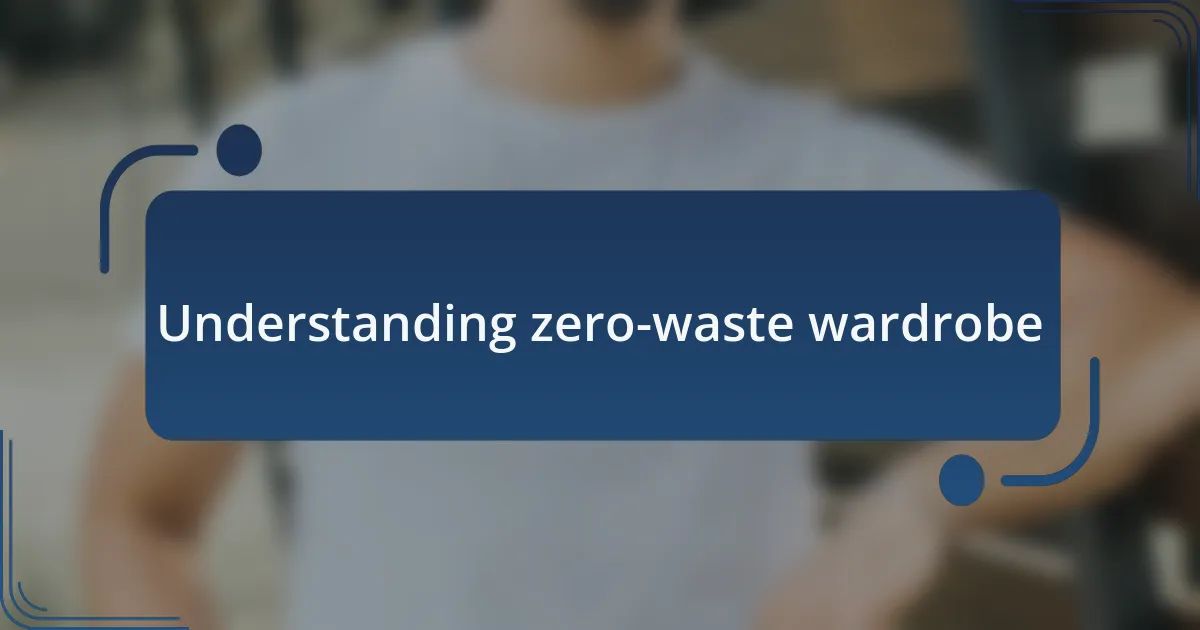
Understanding zero-waste wardrobe
A zero-waste wardrobe is more than just a collection of clothes; it embodies a lifestyle choice that prioritizes sustainability and mindfulness. I still recall the first time I faced my closet filled with fast fashion items, realizing how much waste I was contributing to the environment. It was a wake-up call that inspired me to educate myself about ethical alternatives, leading to the development of my own zero-waste philosophy.
When I think about my journey toward a zero-waste wardrobe, questions often pop into my mind: How can I reduce the impact of my clothing choices? One key element is understanding the lifecycle of garments—from production to disposal. Each piece we buy has a story, and considering that story can enrich our appreciation for our clothes while motivating us to choose wisely.
It can feel daunting to embrace a zero-waste lifestyle, especially when we’re surrounded by fast fashion convenience. However, I’ve found that focusing on quality over quantity has transformed not only my wardrobe but also my mindset. By curating a collection of versatile, durable pieces, I enjoy a simpler, more intentional approach to dressing that brings both joy and purpose to my everyday life.
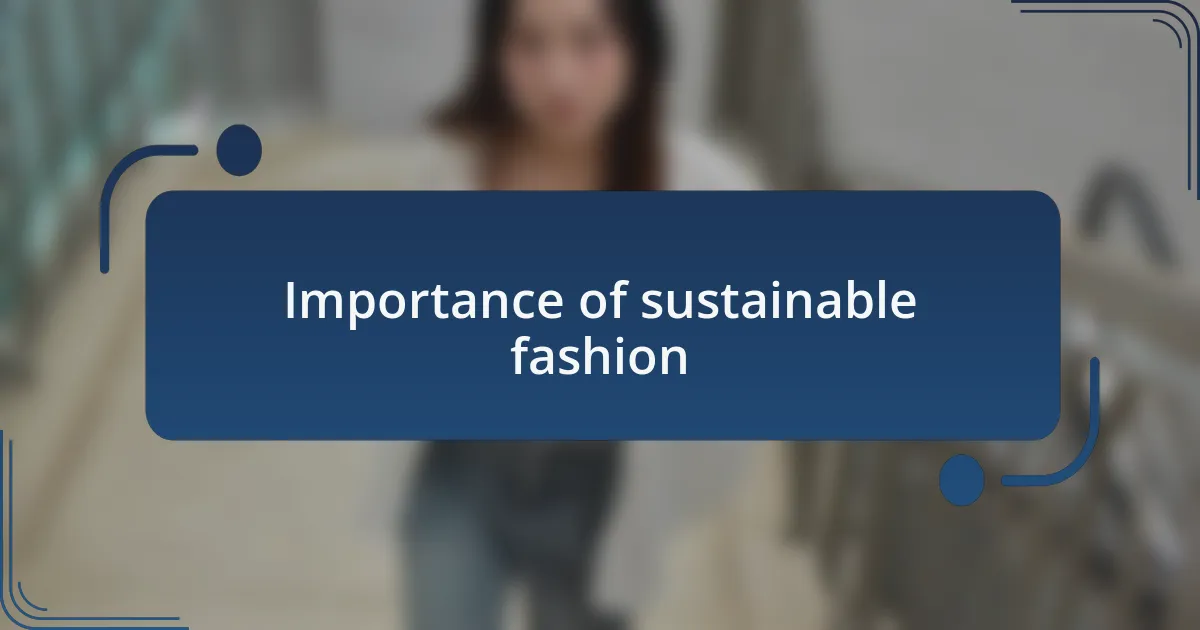
Importance of sustainable fashion
Sustainable fashion is crucial because it helps combat the massive environmental damage caused by the clothing industry. I remember reading that clothing production is responsible for about 10% of global carbon emissions. This stark fact struck me and prompted a shift in the way I view my purchases; every item carries a responsibility that extends far beyond my closet.
The importance of sustainable fashion also lies in its ability to promote ethical practices in the industry. I once stumbled upon a brand that not only creates stylish pieces but also ensures fair wages and safe working conditions for its workers. Learning about this made me realize that my choices could support not just the environment but also the people behind the garments I wear. Isn’t it empowering to think that our wardrobes can reflect our values?
Moreover, embracing sustainable fashion fosters creativity and individuality. I often find joy in mixing and matching timeless pieces, which allow me to express my style without contributing to the cycle of waste. When we shift focus from fleeting trends to wardrobe staples, we not only enhance our personal style but also engage in a meaningful conversation about the impact of our choices on the world around us.
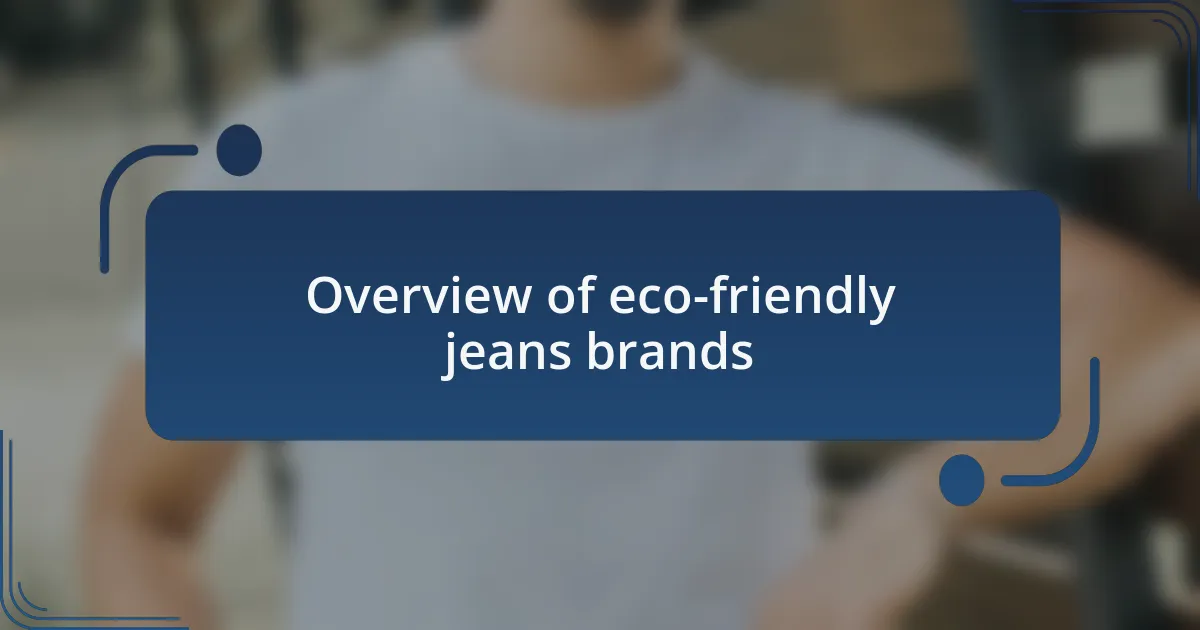
Overview of eco-friendly jeans brands
Many eco-friendly jeans brands are now redefining what it means to enjoy fashion responsibly. I’ve explored several of these brands, and it’s inspiring to see their commitment to sustainable practices — from using organic cotton to adopting water-efficient manufacturing processes. When I first came across a company that uses recycled materials in their jeans, I was amazed at how they turned waste into something both stylish and functional.
One standout brand I discovered is known for its transparent supply chain, which made me feel more connected to my purchase. Knowing that my jeans were made in a facility that prioritizes fair labor conditions gave me a sense of pride. I often wonder how many people take the time to consider the stories behind their clothes. Imagine having a conversation starter every time you wear something with a purpose; it really adds depth to our everyday choices.
Additionally, the rise of second-hand and upcycled denim is transforming the market. I remember finding a vintage pair of jeans at a thrift store, and it felt like uncovering a hidden gem. It not only saved a pair from the landfill but also gave me a unique piece to add to my wardrobe. Don’t you think every wardrobe could benefit from a little history? Eco-friendly jeans brands and the thrift culture they inspire encourage us to rethink our shopping habits while still enjoying fashionable options.
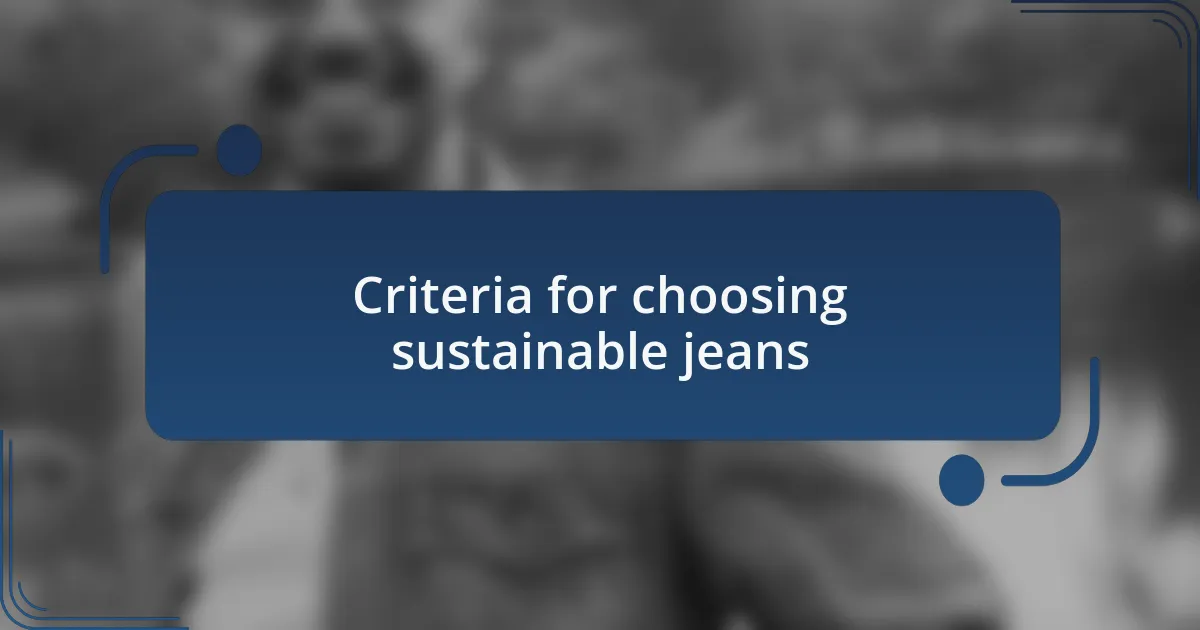
Criteria for choosing sustainable jeans
When selecting sustainable jeans, I always prioritize materials. Organic cotton is a great choice because it’s grown without harmful pesticides. I remember the first time I purchased a pair made from organic cotton; they felt so much better on my skin, and knowing I was supporting better farming practices made them even more special to wear.
Another crucial criterion is the brand’s commitment to ethical manufacturing. I often think about the journey of my clothes, and it gives me a sense of responsibility. A few years back, I stumbled upon a brand that shared stories about the artisans behind their products. That transparency made me feel more connected to my jeans. Have you ever considered how your clothing choices impact others?
Lastly, consider the durability of the jeans. Sustainable jeans should be made to last, reducing the need for frequent replacements. I recall a pair I bought that has withstood countless washes and wears while still looking great. Investing in quality means fewer items in the landfill, which aligns perfectly with my goal of a zero-waste wardrobe. Who doesn’t want jeans that can stand the test of time?

Evaluating jeans brand practices
Evaluating the practices of jeans brands requires a deeper dive into their sourcing and production methodologies. When I first researched a popular brand, I was surprised to learn about their local sourcing for materials. It was refreshing to see how that not only reduced their carbon footprint but also fostered local economies. Have you ever thought about how much impact your jeans can have when they’re made right in your community?
Transparency is another critical factor. I remember visiting a brand’s website where they openly shared their entire supply chain process. It made me feel more secure in my choice, knowing they held themselves accountable to certain labor practices. I often wonder if other brands would benefit from being equally forthcoming. What if more companies adopted this level of honesty?
Lastly, examining a brand’s waste management strategy is essential, extending to how they handle unsold inventory or production scraps. I once discovered a jeans brand that donated their excess fabric to local artists for upcycling. That initiative struck a chord with me. Couldn’t a commitment to reducing waste resonate with more brands? This kind of conscientious approach speaks volumes about a company’s values and motivates buyers like me to support them.
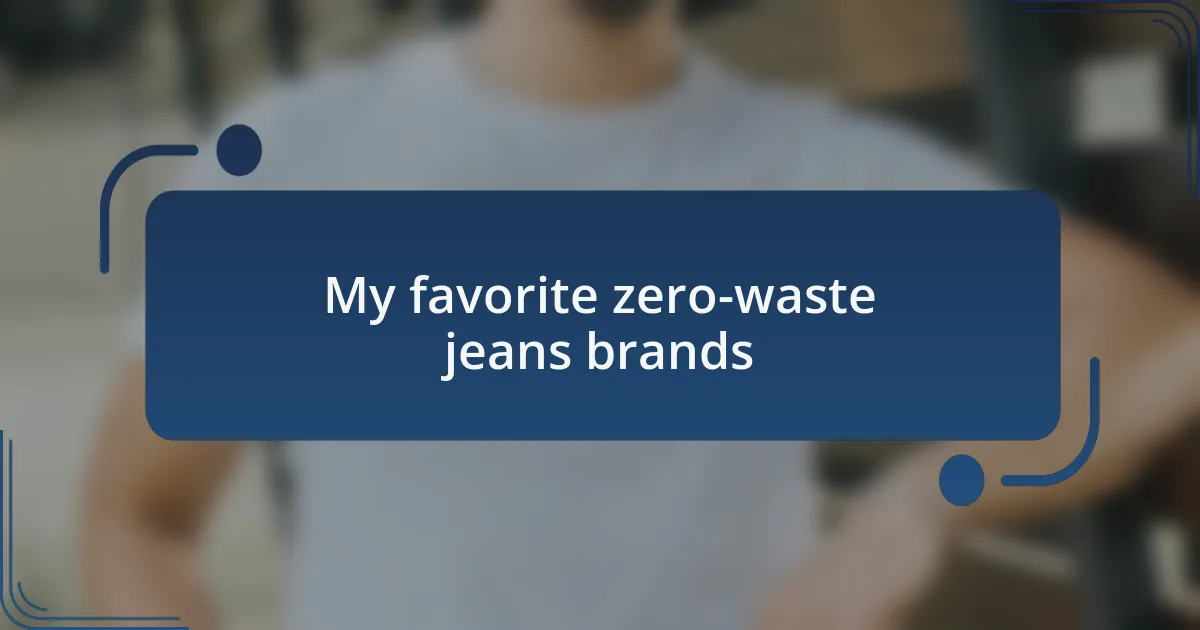
My favorite zero-waste jeans brands
When it comes to zero-waste jeans brands, one of my all-time favorites is Reformation. I still remember the first pair I bought; they not only fit like a dream but also came with the reassurance that I was supporting a brand committed to sustainability. Their transparent production process and eco-friendly materials made me feel like I was making a real difference with my purchase. Have you ever experienced that sense of pride when you know your fashion choices are doing good?
Another brand that stands out to me is Nudie Jeans. Their commitment to recycling old jeans is impressive—what a great way to close the loop in fashion! I found it heartwarming that they offer free repairs for life, encouraging repair over disposal. It made me think: how many other brands would create such a relationship with their customers?
Lastly, I cannot overlook the impact of Mud Jeans. Their lease system allows customers to wear jeans for a while before returning them for recycling. When I first heard of this concept, I was intrigued—imagine wearing trendy jeans without the guilt of contributing to waste. It’s a refreshing approach that really made me reconsider how I view ownership in fashion. What if more brands adopted such innovative practices?